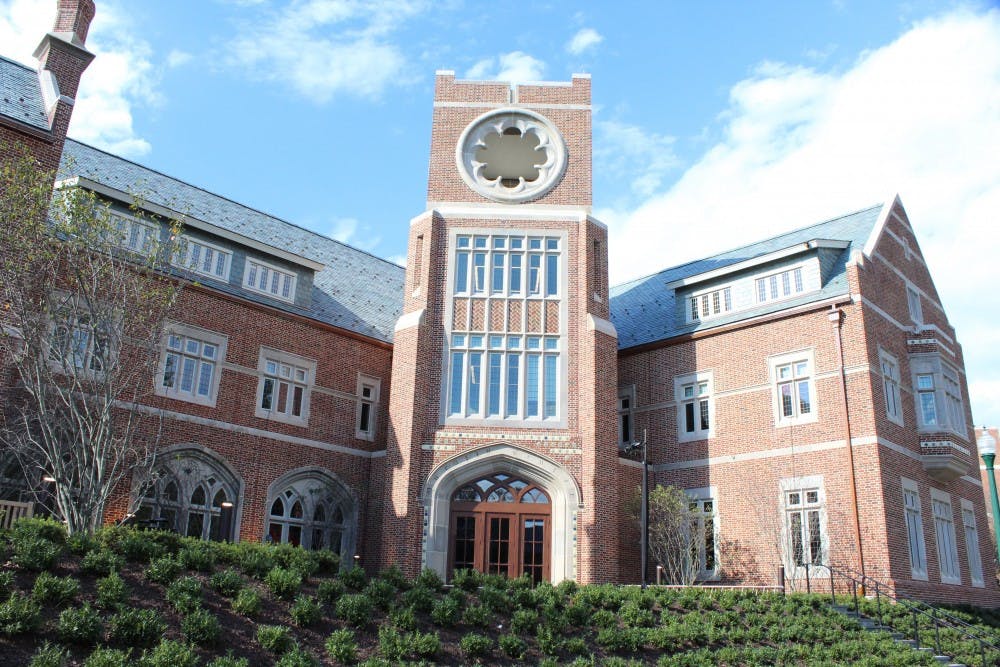The University of Richmond welcomed Atifete Jahjaga, former president of Kosovo, to campus on Feb. 27 for a special program titled “Empowering Insights.”
“President Atifete Jahjaga made history in 2011 when she was elected president of Kosovo,” said Jennifer Jones Cavenaugh, dean of the School of Arts and Sciences. “Her presidency spanning five years symbolizes progress and change, as she became not only the youngest leader in the nation's history at 35, but also its first female president.”
Jahjaga was elected as the third president of Kosovo In the first round of voting by Parliament, with 80 out of 100 members of parliament voting in her favor, making her the only president to achieve such a result. No other presidential candidates to date have been elected in the initial round of voting by the Kosovo parliament, Cavenaugh said.
Cavenaugh asked Jahjaga questions about her presidency and advocacy. They discussed her initiatives for women and minority populations in Kosovo, specifically her actions supporting equal representation in the Kosovo government.
“As the first woman president. I was very firm that the half of my cabinet was going to be composed by women, because 51% of the population of Kosovo are women, and the other half was to be composed by the young people,” Jahjaga said. “How would I be able to fulfill my constitutional rights or legal obligation if I would not have input from the majority of my population?”
This elicited an enthusiastic round of applause from the audience.
Unprecedentedly, Jahjaga also hired a Serbian minority committee member as her advisor. She shared the importance of serving the entire people of Kosovo where every citizen could enjoy equal rights during her presidency.
Sharing more of her actions for female empowerment, Jahjaga explained the policy she implemented to elevate women. She enacted a quota system to ensure 30% of assembly seats were reserved for women, and this system spread to other political and economic spheres.
“I was very much focused on the economic and on the political participation for women, because it was the first country who has adopted a quota for women representation across the board,” Jahjaga said. “Every law that was not meeting the requirements of the women representation I had a zero tolerance with. And still there's participation across the board to the central level and towards the local level.”
In an emotional segment of the conversation, Jahjaga shared her advocacy for sexual violence survivors of the Kosovo War. She has personally met with over 8,000 survivors and is passionate about providing care and recognition for every person affected. In a culture that pushes shame and stigma onto sexual violence survivors, Jahjaga worked to give them a voice and continued the effort after her presidency.
“So throughout my mandate, I had a very specific attention within my capacity and with my powers as the president of Kosovo,” Jahjaga said. “But after leaving the office, I founded the Jahjaga Foundation to continue building on access to free medical services and tackling the culture of impurity.”
The conversation opened up to audience questions before concluding, giving students an opportunity to voice their curiosities. Students asked Jahjaga about Kosovo’s relationship with the E.U., the threat of terrorism and tensions with Serbia.
Enjoy what you're reading?
Signup for our newsletter
“She was incredibly open,” said senior Eli Chancey, who had the opportunity to ask Jahjaga a question during the event. “She had a great balance between professionalism and being a career politician and having to watch every word that you speak, but also connecting with everyone and giving honest answers.”
Jahjaga’s pride and love for Kosovo shined through her discussion.
She championed Kosovo’s resilience. “People have a tendency to initially resist help. But the people of Kosovo embrace it,” she said. “Maybe it's good for us. We will try. If it doesn't work, we will change on that.”
Contact writer Madison Slesinski at Madison.Slesinski@richmond.edu .
Support independent student media
You can make a tax-deductible donation by clicking the button below, which takes you to our secure PayPal account. The page is set up to receive contributions in whatever amount you designate. We look forward to using the money we raise to further our mission of providing honest and accurate information to students, faculty, staff, alumni and others in the general public.
Donate Now



